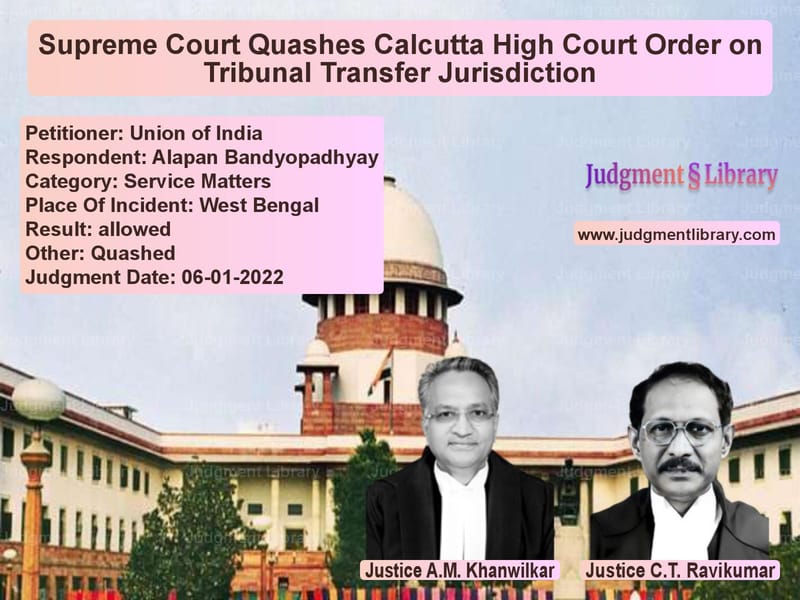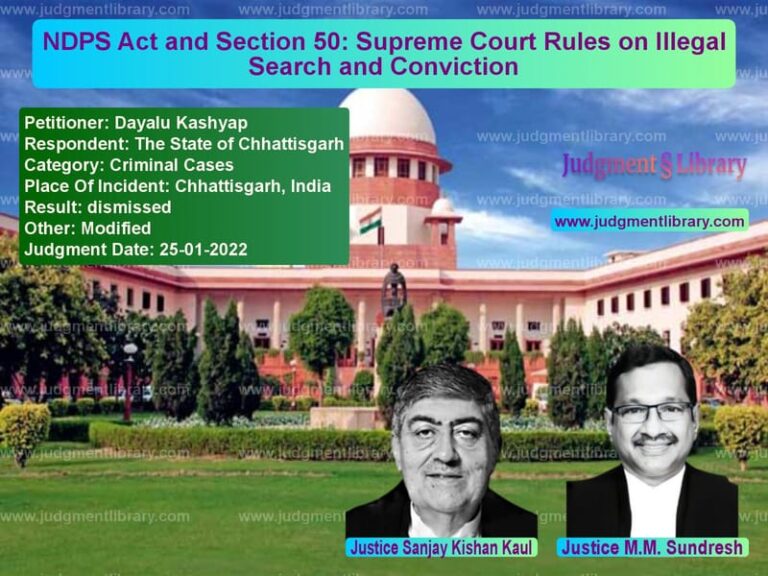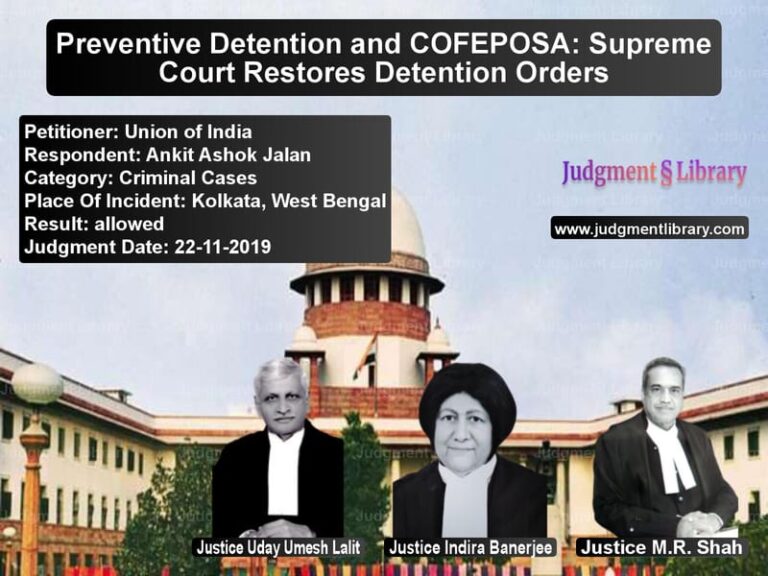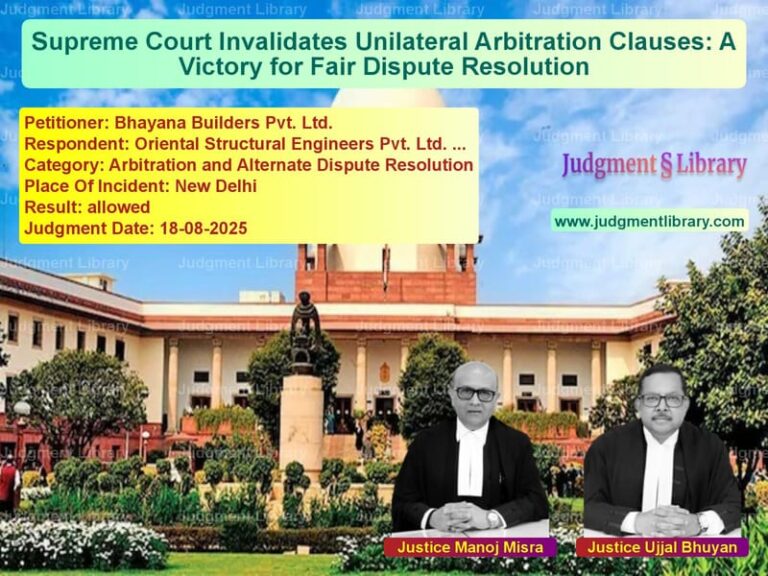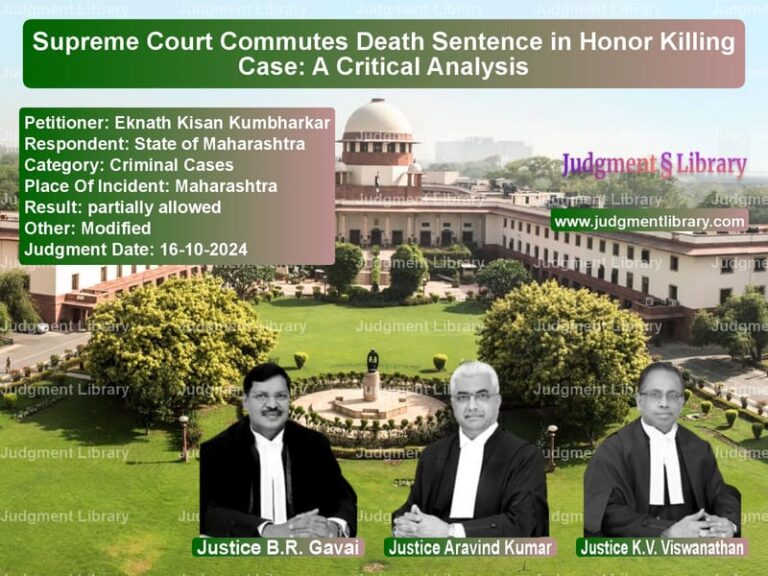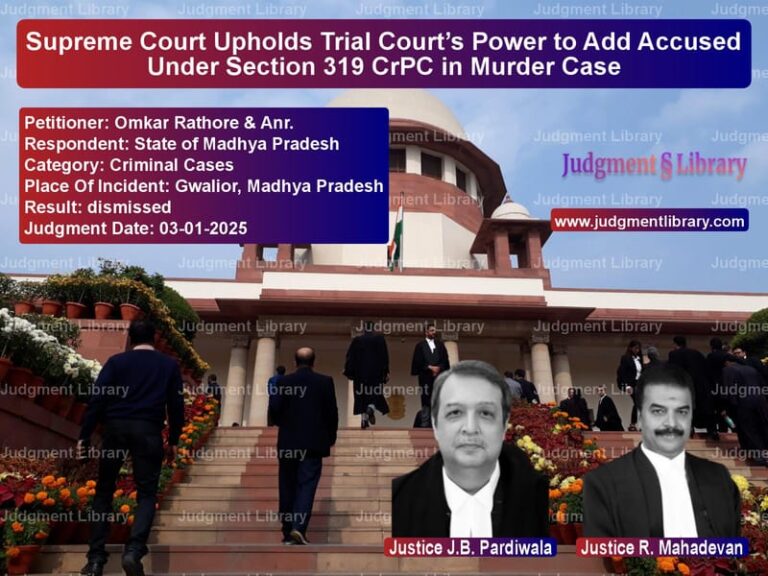Supreme Court Quashes Calcutta High Court Order on Tribunal Transfer Jurisdiction
The Supreme Court of India has set aside a ruling by the Calcutta High Court in the case of Union of India vs. Alapan Bandyopadhyay, holding that the High Court lacked jurisdiction to hear a challenge against an order passed by the Principal Bench of the Central Administrative Tribunal (CAT) in New Delhi. The dispute arose over the transfer of a disciplinary case from the Kolkata Bench of the CAT to its Principal Bench in New Delhi, a decision that was subsequently challenged before the High Court at Calcutta.
Background of the Case
The respondent, Alapan Bandyopadhyay, a former Chief Secretary of West Bengal, filed an Original Application (O.A.) before the Kolkata Bench of the Central Administrative Tribunal challenging disciplinary proceedings initiated against him for failing to attend a review meeting chaired by the Prime Minister of India on May 28, 2021, concerning the cyclone ‘YAAS’. The Union of India, the appellant, then moved a transfer petition under Section 25 of the Administrative Tribunals Act, 1985, seeking to transfer the O.A. from the Kolkata Bench to the Principal Bench in New Delhi. The Tribunal Chairman, sitting at the Principal Bench, allowed the transfer.
The respondent then challenged the transfer order before the Calcutta High Court, which set aside the Tribunal’s decision, holding that the Principal Bench had acted beyond its jurisdiction. The Union of India, aggrieved by this ruling, appealed to the Supreme Court.
Arguments by the Petitioner (Union of India)
- The Union of India argued that the High Court at Calcutta lacked jurisdiction to entertain a challenge against an order passed by the Principal Bench of the CAT in New Delhi.
- The government relied on the Supreme Court’s ruling in L. Chandra Kumar v. Union of India, which held that decisions of Tribunals are subject to judicial review before the High Court within whose territorial jurisdiction the Tribunal concerned falls.
- Since the transfer order was passed by the Principal Bench of the CAT in New Delhi, only the Delhi High Court had jurisdiction to review it.
- It was further contended that the Chairman of the Tribunal has the statutory power under Section 25 of the Administrative Tribunals Act, 1985, to transfer cases from one Bench to another.
Arguments by the Respondent (Alapan Bandyopadhyay)
- The respondent contended that the cause of action arose in West Bengal, as the disciplinary proceedings pertained to his role as Chief Secretary in the state.
- He argued that the transfer order violated principles of natural justice and was passed arbitrarily.
- He also asserted that the Kolkata Bench of the CAT had jurisdiction over the matter since the events leading to the disciplinary proceedings occurred in West Bengal.
Observations of the Supreme Court
The Supreme Court carefully examined the legal principles governing judicial review of Tribunal decisions and observed:
“All decisions of these Tribunals will, however, be subject to scrutiny before a Division Bench of the High Court within whose jurisdiction the concerned Tribunal falls.”
The Court further noted:
“Taking another view would undoubtedly result in indefiniteness and multiplicity in the matter of jurisdiction, especially in cases involving multiple parties residing within the jurisdiction of different High Courts.”
The Court criticized the High Court at Calcutta for failing to determine its jurisdiction before addressing the merits of the transfer order.
Final Judgment
The Supreme Court set aside the ruling of the Calcutta High Court and dismissed the writ petition filed before it, stating:
“The Principal Bench of the Central Administrative Tribunal at New Delhi falls within the territorial jurisdiction of the High Court of Delhi. The power of judicial review of an order transferring an Original Application pending before a Bench of the Tribunal to another Bench under Section 25 of the Act can be judicially reviewed only by a Division Bench of the High Court within whose territorial jurisdiction the Bench passing the same, falls.”
Read also: https://judgmentlibrary.com/supreme-court-upholds-dismissal-of-msrtc-driver-in-fatal-accident-case/
The Court, however, granted the respondent the liberty to challenge the transfer order before the Delhi High Court if he so desired.
Implications of the Judgment
- The ruling clarifies that challenges against transfer orders passed by the Principal Bench of the CAT must be filed before the Delhi High Court.
- It reinforces the jurisdictional boundaries of High Courts in reviewing decisions made by Tribunals.
- The judgment prevents potential forum shopping by litigants seeking a favorable jurisdiction.
- The ruling upholds the authority of the CAT Chairman in transferring cases under Section 25 of the Administrative Tribunals Act.
Petitioner Name: Union of India.Respondent Name: Alapan Bandyopadhyay.Judgment By: Justice A.M. Khanwilkar, Justice C.T. Ravikumar.Place Of Incident: West Bengal.Judgment Date: 06-01-2022.
Don’t miss out on the full details! Download the complete judgment in PDF format below and gain valuable insights instantly!
Download Judgment: union-of-india-vs-alapan-bandyopadhyay-supreme-court-of-india-judgment-dated-06-01-2022.pdf
Directly Download Judgment: Directly download this Judgment
See all petitions in Employment Disputes
See all petitions in Public Sector Employees
See all petitions in Judgment by A M Khanwilkar
See all petitions in Judgment by C.T. Ravikumar
See all petitions in allowed
See all petitions in Quashed
See all petitions in supreme court of India judgments January 2022
See all petitions in 2022 judgments
See all posts in Service Matters Category
See all allowed petitions in Service Matters Category
See all Dismissed petitions in Service Matters Category
See all partially allowed petitions in Service Matters Category

